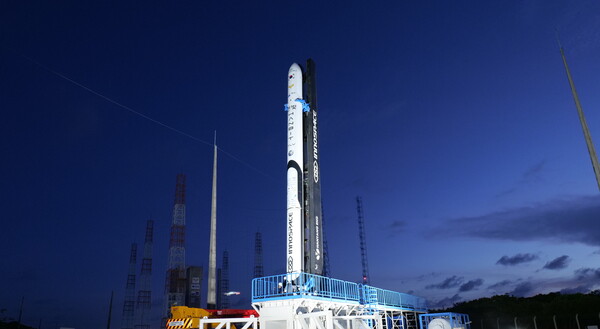
Update2: Innospace's third and final launch attempt within the approved December 14-21 window did not go as planned. An anomaly was detected in the safety management system on December 21 as the team prepared for the launch countdown, which led to the cancellation of the campaign. An investigation is underway to determine the cause of the anomaly. Innospace will announce the next launch window after consulting with the Brazilian military.
Update1: Innospace announced that it has scheduled HANBIT-TLV's third launch attempt for 6 p.m. (Korea standard time) on December 21.
South Korea’s Innospace scrubbed the inaugural launch of its suborbital technology demonstration rocket Dec. 20 due to a valve issue.
The issue was detected around 2 a.m. Eastern during the final pre-launch checkup of the rocket, called HANBIT-TLV, at its designated launch pad at the Alcântara Space Center in Brazil, the company said in a Dec. 20 statement. The rocket was supposed to lift off at 4 a.m. Eastern, but was instead rolled back into its hangar for further examination.
Innospace said in it “needed additional checkups on its valve of test launch vehicle” and that the team at the Alcântara Space Center will “take hold of this issue soon, and set [a] target launch date again.” The company didn’t elaborate on the valve issue. The rocket’s launch window remains open until Dec. 21.
HANBIT-TLV was initially set to lift off Dec. 19, but it slipped to the following day due to heavy rain around the space center.
HANBIT-TLV is a 16.3-meter, single-stage test rocket designed to be powered by the company’s self-developed 15-ton-thrust hybrid rocket engine that uses liquid oxygen and paraffin-based propellants. It is a precursor to the company’s planned commercial satellite launcher Hanbit-Nano, a two-stage small satellite launcher designed to carry up to a 50-kilogram payload to a 500-kilometer sun-synchronous orbit.
Aboard HANBIT-TLV is an inertial navigation system, called SISNAV, developed by the Brazilian Department of Aerospace Science and Technology (DCTA) under the supervision of the Brazilian Air Force.
In April, Innospace signed an agreement with the Brazilian Department of Aerospace Science and Technology to launch SISNAV on the rocket in exchange for use of Alcântara Space Center, operated by the Brazilian air force.
The payload is a navigation device that uses a computer, motion sensors and rotation sensors to continuously calculate by dead reckoning the position, the orientation, and the velocity of a moving object without the need for external references. The payload won’t be deployed from the rocket in the test, according to the company’s spokesperson.
<관련 링크>
이노스페이스, 민간 발사체 '한빛' 발사 연기...냉각벨브 이상
매체: 뉴시스 발행일: 2022.12.20 작성자: 윤현성 기자
https://newsis.com/view/?id=NISX20221220_0002130236&cID=10406&pID=13100

